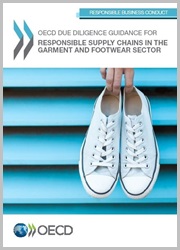
Updated OECD Guidelines place stronger demands on companies
The updated OECD Guidelines for Multinational Enterprises, released today June 8th, place higher demands on responsible business practices in several areas and provide civil society with more grounds to demand corporate accountability. Read a Q&A with Swedwatch’s Malena Wåhlin, who provided input to the revision.
The OECD Guidelines for Multinational Enterprises on Responsible Business Conduct (the Guidelines) apply to all businesses from OECD countries and are, along with the UN Guiding Principles for Business and Human Rights, considered to be the most important guidelines on responsible businesses conduct. They also work as a tool for communities and workers to hold businesses to account.
The Guidelines were first adopted in 1976 and have been reviewed several times, but this is the first update in over ten years. Malena Wåhlin, responsible for Swedwatch’s work on human rights defenders and a member of the OECD Watch Coordination Committee, shares her views on which are the key improvements.
As a member of the civil society network OECD Watch, Swedwatch during 2022 provided input to the OECD Working Party on Responsible Business Conduct, who was responsible for the drafting. Our input has particularly concerned improvements in consultation with stakeholders and the situation for human rights and environmental defenders.
The Guidelines have been reviewed several times. What are the three main improvements in this latest update?
The 2011 update saw a new chapter on human rights due diligence, and this was a huge win for civil society. The new update is not as extensive but still contains important advancements regarding for example the inclusion of environmental impacts as a necessary part of the due diligence process of businesses.
The update also makes clear that companies should consider workers rights in their whole value chain, not only those employed by the company. Another key clarification is that businesses have to refrain from reprisals against human rights defenders and address impacts from reprisals, including in business partners’ operations, and that they need to consult with affected stakeholders. The engagement should be two-way, conducted in good faith, responsive to stakeholders’ views, timely, accessible, safe, and adapted to remove barriers to engagement.
In short, what real difference does these improvements make for organisations trying to hold companies to account?
The updated guidelines do not go further than other existing international norms, but bring more clarity than previous versions to what aspects the due diligence processes should cover. Hence, companies are expected to analyse risks, for example to biodiversity and climate, and consult local stakeholders on a broader range of issues than before. It also means civil society and others trying to hold companies to account for negative impacts will be able to file complaints on a broader range of issues than before. Hopefully, that can make a difference.
Where there improvements, suggested by OECD Watch, that were not included or that were watered down?
Yes. We would have liked the update to cover more aspects and use stronger wording in several places. For example, the rights of marginalized groups and indigenous peoples is not as strong as we had hoped. We also wanted the updated Guidelines to put stronger requirements on the National Contact Points (NCPs) that are often weak and ineffective.
The Guidelines are but not binding. Is there a mechanism to ensure that companies adhere to the recommendations?
They are not legally binding for companies but for OECD countries, whose governments are required to ensure that the Guidelines are implemented and observed. One requirement is to establish an NCP that handles complaints against potential company breaches. However, an NCP-complaint is a non-judicial kind of grievance mechanism focused on mediation and finding a solution to harm done that both parties can accept. There are no legal sanctions against companies breaching the guidelines which we consider is their biggest weakness.
The update is particularly timely as it comes at a key moment in the development of mandatory due diligence legislation within the EU – the Corporate Sustainability due Diligence Directive (CSDDD). How will that correspond to the Guidelines?
The upcoming law will require EU businesses and businesses providing products or services to the EU market to ensure that their global value chains, including in OECD members countries outside the EU, are free from human rights and environmental abuse. As the CSDDD is largely built on the same concepts as the OECD Guidelines, the Guidelines will remain a valid key guidance document for due diligence inside and outside of the EU. If anything, the Guidelines are more explicit about the extent of due diligence required and that companies’ responsibility applies to the whole value chain.



